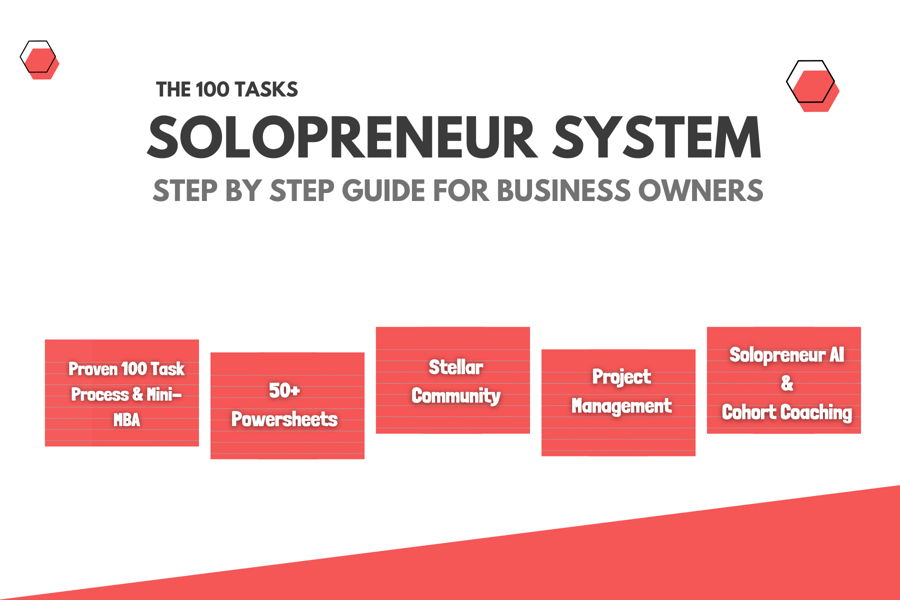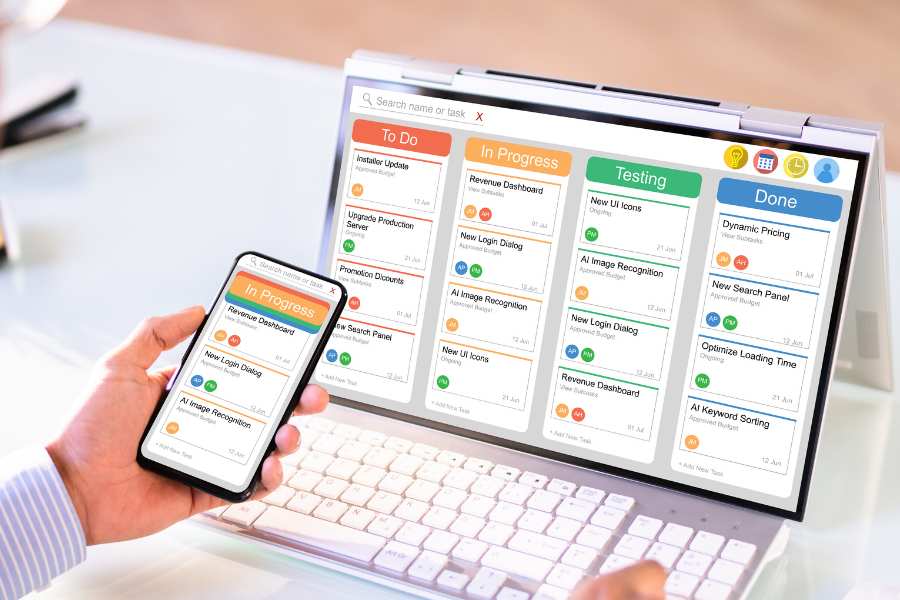These remote work best practices and freelancing rules for working remotely will help you boost productivity and collaboration as an independent contractor.
As freelancers and employers navigate the complexities of remote work, a clear understanding of remote work best practices, freelancing rules, and guidelines for working remotely becomes indispensable.
Mastering the art of remote collaboration as a freelancer, solopreneur, independent contractor, or 1099 employee demands adherence to a set of established remote work protocols for productivity and successful freelance collaboration.
In this article we explore remote work protocols, standards, and norms, exploring best practices, collaboration strategies, and the essential rules that govern successful and efficient remote collaborations to foster a productive and compliant remote working environment.
Click here to get the 100 Tasks Solopreneur System
Contents
- Remote Work Best Practices for Freelancers & Independent Contractors
- #1. Communication Channels
- #2. Work Hours & Availability
- #3. Project Scope & Deadlines
- #4. Freelance Payment Terms
- #5. Project Management & Collaboration Tools
- #6. Feedback, Revisions & Improvement
- #7. Data Security & Confidentiality
- #8. Performance Metrics & Reporting
- #9. Emergency Protocols
- #10. Comprehensive Freelance Contracts
- #11. Professional Development & Training
- #12. Health & Safety Guidelines
- #13. Cultural Considerations
- #14. Tax & Legal Compliance
- Freelancing & Remote Work Tips & Tools
- Conclusion
Remote Work Best Practices for Freelancers & Independent Contractors
When working as a freelancer in a remote setting, it’s important to establish clear rules and expectations with your clients or employers to ensure a smooth and productive working relationship. Here are some suggested remote work rules to discuss and set:
#1. Communication Channels
As a remote freelancer, effective communication is an important factor for project success. Specifying preferred communication channels, such as email, messaging apps, or project management tools, sets the groundwork for streamlined interactions.
Defining response times for messages and emails ensures a prompt exchange of information, promoting efficiency and preventing potential delays. Additionally, it’s crucial to establish guidelines regarding the use of video calls or conference calls for meetings.
Whether it’s a quick check-in or a comprehensive project discussion, clarifying the preferred mode of communication fosters a cohesive and collaborative working environment, ultimately contributing to the overall success of the freelancer-employer partnership.
Enrich your remote work experience by learning how to enhance communication, collaboration, and productivity in the Working Remotely: How To Succeed In The New Workplace Course. Tailor effective daily routines and optimize workspaces to boost motivation, efficiency, and comfort in your unique remote work environment.
#2. Work Hours & Availability
Creating a framework for working hours and availability is essential in remote freelancing. Clearly defining set working hours provides structure and allows for effective collaboration.
It’s equally important to discuss time zone differences, acknowledge potential challenges, and establish strategies to manage them. This may involve staggered working hours, flexible meeting schedules, or agreed-upon overlap periods.
Additionally, setting expectations regarding flexibility and overtime is crucial. Both freelancers and employers should communicate their preferences and limitations, fostering a balanced approach to workload management.
Establishing a mutual understanding of flexibility and overtime helps maintain a healthy work-life balance and promotes a positive and productive working relationship.
In the Remote Work Best Practices and Websites Course, you’ll discover best practices for remote work, including remote meetings, ergonomic workspaces, and well-being tips.
#3. Project Scope & Deadlines
Project clarity means clearly defining the scope of work for each project, ensuring both parties have a comprehensive understanding of deliverables and expectations. Setting realistic deadlines and milestones further solidifies project management, providing a roadmap for progress.
Equally crucial is the discussion surrounding potential changes to the project scope. Establish transparent communication channels to address any modifications promptly. Discuss how alterations will be assessed, whether they involve additional compensation, extended timelines, or other adjustments.
Learn how to manage client expectations effectively in the Remote Work Best Practices and Websites Course. This proactive approach to handling changes fosters understanding and prevents misunderstandings, contributing to a successful and collaborative freelancer-employer relationship.
#4. Freelance Payment Terms
Establishing clear and transparent payment terms is fundamental for a successful freelance collaboration. You must clarify your accepted payment methods to ensure a seamless transaction process.
Begin by specifying rates, discussing how fees will be calculated, and outlining the invoicing frequency, whether it’s weekly, bi-weekly, or upon project completion.
There are various ways to charge for freelance services:
- Hourly Rate: Charge clients based on the number of hours worked.
- Project-based Fee: Set a fixed fee for the entire project.
- Word Count or Page Rate: Common for writing and editing projects.
- Retainer: Charge a monthly fee for a set number of hours or services.
- Performance-based: Tie payment to specific outcomes or milestones.
Consider factors like your skill level, the complexity of the project, market rates, and client budgets when determining your pricing. Additionally, consider discussing upfront payments, milestones, or deposits required for the project.
Clear communication with clients regarding freelancing rates and project scope is essential to prevent misunderstandings and establish mutual commitment and financial security. Learn to use financial tools to streamline invoice and payment management for freelancers.
Clearly defining payment schedules for milestones aligns both parties, fostering trust and fairness. Open communication on payment terms is crucial for avoiding misunderstandings and promoting a positive professional partnership.
The Fiverr Workspace Tool is the freelancer’s one-stop app for time tracking, invoicing, payments, proposals, contracts, task management, and income and expense tracking. This business management software is designed to help freelancers, solopreneurs, and entrepreneurs save time on running their businesses.
#5. Project Management & Collaboration Tools
Selecting suitable project management and collaboration tools is a crucial step in remote freelancing.
Reach a consensus on the tools to use, whether project management platforms like Trello or Asana, communication tools like Slack or Microsoft Teams, or file-sharing platforms. This ensures a unified and efficient workflow.
In the Asana: Project and Task Management for Remote Teams Course, you’ll learn how to use this popular remote work productivity app designed to help teams organize, track, and manage their work.
Once tools are established, determine how progress will be tracked and reported. Define key performance indicators (KPIs) relevant to the project and set up regular check-ins or status updates.
This creates transparency and accountability, allowing both the freelancer and the employer to monitor project advancement effectively. Ensuring access to necessary resources and information is equally vital.
Establish a system for sharing relevant documents, files, and data promptly. This guarantees that freelancers have the tools needed to deliver high-quality work and minimizes potential delays.
A well-coordinated approach to project management and resource accessibility sets the foundation for a productive and collaborative remote working environment.
#6. Feedback, Revisions & Improvement
Defining the feedback and revision process is crucial for a smooth and collaborative freelance project. Discuss the preferred feedback method, whether through project management tools or meetings, and establish a constructive framework for productive communication.
Additionally, determine the number of revisions in the contract, outlining what constitutes a revision and setting expectations. This ensures the project stays on track, preventing scope creep.
Clarify feedback and approval timelines to maintain project momentum, discussing deadlines for deliverable feedback and final approvals. This aligns both the freelancer and the employer regarding project timelines, preventing unnecessary delays.
By addressing these aspects, a structured approach to feedback and revisions is created, fostering a collaborative and efficient working relationship between freelancers and employers.
Fostering open communication is key to successful remote freelancing relationships. Encourage a culture of constructive feedback, emphasizing its role in continuous improvement. Initiate discussions on collaborative enhancement of the working relationship and achieving better outcomes.
Establish a feedback framework promoting constructive criticism and acknowledging achievements, creating a safe space for freelancers and employers to contribute to project success.
Discuss specific areas for collaborative improvement, involving refining communication protocols, adjusting project timelines, or enhancing certain skill sets. Be open to feedback from both sides and work together to implement changes benefiting the overall collaboration.
Regularly scheduled check-ins or feedback sessions provide dedicated time for these discussions. This proactive approach not only addresses issues promptly but also strengthens the working relationship, demonstrating a commitment to mutual growth and success.
By promoting open communication and collaboration for improvement, freelancers and employers can create a dynamic and adaptable working relationship that evolves positively over time, contributing to a resilient and mutually beneficial partnership in remote freelancing.
#7. Data Security & Confidentiality
Freelancers must prioritize cybersecurity measures and establish clear protocols for handling and storing data, ensuring compliance with relevant privacy regulations to safeguard sensitive information, protect client information and confidentiality, and maintain trust.
Implementing encryption, using secure communication channels, and regularly updating security software are fundamental remote work best practices.
By adopting robust data security measures, freelancers can enhance their professional credibility and provide clients with the confidence that their information is handled with the utmost care.
In this Digital Security Awareness Training, you’ll learn data security, identify threats, guard against social engineering, prevent identity theft, classify data sensitivity, protect against malware, avoid spam, and establish a security policy for your home or business.
Initiate a conversation with clients to address data security concerns, outlining the measures in place to safeguard confidential information. Discuss any legal or regulatory requirements relevant to the handling of sensitive data, ensuring compliance with data protection laws.
Clearly define how sensitive information and data will be handled throughout the project. Establish protocols for sharing, storing, and transmitting confidential data securely.
This may involve encryption methods, secure file-sharing platforms, and access controls to limit who can view or handle sensitive information. Implement necessary security measures to mitigate risks.
This can include the use of virtual private networks (VPNs), multi-factor authentication, and regular security audits. AtlasVPN encrypts your online activities with safeguards against ISP detection, ensuring consistent connection speeds and privacy.
Ensure secure internet connections by encrypting your data, and protecting sensitive information from potential threats and unauthorized access. Collaboratively identify potential vulnerabilities and establish contingency plans in case of a security breach.
By proactively addressing data security concerns, discussing data handling practices, and implementing robust cybersecurity measures, both freelancers and employers contribute to a secure working environment, fostering trust and confidence in the collaboration.
#8. Performance Metrics & Reporting
Establishing clear performance metrics is pivotal for project success as a freelancer or independent contractor. Begin by defining key performance indicators (KPIs) relevant to the project’s goals.
Whether it’s meeting deadlines, achieving specific milestones, or delivering high-quality work, identifying and aligning on these metrics provides a framework for success. Discuss regular reporting and performance reviews to track progress effectively.
Determine the frequency of updates, whether it’s weekly, bi-weekly, or at project milestones. This ensures that both freelancers and employers are well-informed about the project’s trajectory, allowing for timely adjustments if necessary.
Moreover, ensure alignment on project goals and expectations. Communicate the overarching objectives of the project and discuss how success will be measured.
This shared understanding fosters collaboration and helps avoid potential misalignments down the line, contributing to a more successful and harmonious working relationship.
#9. Emergency Protocols
Anticipate and address unforeseen circumstances to maintain project continuity. Establish clear protocols for dealing with technical issues or personal emergencies that may impact your ability to work as a freelancer.
Develop contingency plans to ensure project continuity in the face of unexpected events. For technical issues, define troubleshooting steps and alternative communication methods.
In the case of personal emergencies, establish a communication protocol for notifying the client promptly and discuss potential adjustments to project timelines. Consider incorporating backup resources or cross-training team members to step in during emergencies.
This ensures that essential tasks can continue even when you face unexpected challenges. Additionally, discuss any potential impacts on deadlines and deliverables, and establish a process for revising project timelines if needed.
By proactively addressing unforeseen circumstances and having contingency plans in place, freelancers and employers can navigate challenges effectively, minimizing disruptions and maintaining the momentum of the project.
This level of preparedness contributes to a resilient and collaborative working relationship.
#10. Comprehensive Freelance Contracts
Building a successful career as a remote freelancer necessitates a robust legal framework. A freelance contract, a cornerstone document for freelancers and employers alike, outlines crucial terms and conditions, ensuring a clear understanding of the working relationship.
Ensure that your independent contractor contract includes explicit details on termination conditions, notice periods, and penalties, as well as issues such as intellectual property to manage expectations and structure potential contract terminations.
Incorporating a dispute resolution section charts a predefined path for conflict resolution, whether through mediation, arbitration, or other methods. Consult legal professionals to ensure your freelance agreement’s comprehensiveness, adherence to laws, and alignment with freelancing nuances.
This collaborative approach, supported by a thorough and legally sound contract, establishes a foundation fostering trust, transparency, and clarity throughout the freelance project.
#11. Professional Development & Training
Ongoing professional development is not only beneficial for the individual freelancer but can also enhance the overall quality of the project. Discussing opportunities for professional growth and skill-building activities contributes to a mutually beneficial relationship.
Initiate a conversation about potential areas for professional development that align with the project’s goals. This could include acquiring new technical skills, staying updated on industry trends, or participating in relevant training programs.
Agree on the types of training or educational opportunities that would be most beneficial to the project’s success. Incorporate skill-building activities into the project plan, recognizing that an investment in the freelancer’s professional development can lead to enhanced project outcomes.
This may involve allocating time for training, providing access to relevant resources, or even supporting participation in online courses or workshops. This proactive approach enhances the freelancer’s capabilities and ensures that the project benefits from a constantly evolving skill set.
By fostering a culture of continuous learning and skill development, freelancers and employers can contribute to the success of the current project and build a foundation for long-term collaboration.
#12. Health & Safety Guidelines
Prioritizing the well-being of both freelancers and employers is essential in remote work scenarios. Initiate a conversation to establish clear guidelines that contribute to a healthy work-life balance and overall well-being.
Discuss expectations regarding breaks and time off, acknowledging the importance of downtime for mental and physical health. Define norms for taking breaks during the workday and communicate any specific expectations related to response times during non-working hours.
Consider implementing flexible scheduling arrangements that accommodate individual needs, allowing freelancers to manage their workloads effectively. Encourage open communication about work-related stressors and provide support mechanisms for both parties.
Incorporate a discussion about planned time off, whether for vacations, personal days, or other reasons. Establish a process for notifying the client in advance and discuss any potential impacts on project timelines. A transparent approach to time off fosters understanding and helps manage expectations.
By prioritizing the well-being of both freelancers and employers, remote work relationships can thrive in a supportive and positive environment. This approach not only contributes to individual happiness and satisfaction but also enhances overall productivity and the quality of work produced.
#13. Cultural Considerations
Acknowledging and respecting cultural differences is crucial in remote freelancing to foster a positive and inclusive work environment. Initiate discussions about individual cultural backgrounds and communication styles to ensure mutual understanding and effective collaboration.
Consider the nuances of communication styles, including preferences for directness, formality, or the use of certain channels. Establish guidelines that accommodate diverse communication approaches, promoting a more inclusive atmosphere where everyone feels comfortable expressing themselves.
Create a work environment that values diversity and inclusivity. Encourage an open dialogue about cultural considerations and potential cultural differences that may impact work dynamics.
This might involve providing resources on cultural awareness or sensitivity training to ensure that both freelancers and employers are well-equipped to navigate diverse perspectives.
Promote a respectful and inclusive atmosphere where all team members feel valued and heard. Establish norms that discourage discrimination or bias and actively address any issues that may arise.
Emphasize the importance of fostering a culture of mutual respect, where differences are celebrated as strengths that contribute to the success of the overall collaboration.
By actively considering and embracing cultural differences, freelancers and employers contribute to a more harmonious and productive remote working environment. This approach not only enriches the collaborative experience but also enhances the overall quality of work produced.
#14. Tax & Legal Compliance
Compliance with local and international labor laws is paramount in remote freelancing to ensure a legal and ethical working relationship. Initiate discussions to address legal considerations and responsibilities related to labor laws and taxation.
As a freelancer, ensure that both you and your employers are aware of and adhere to the relevant labor laws in your respective locations. This includes understanding regulations related to working hours, minimum wage, overtime, and other employment-related matters.
Discuss tax-related considerations to ensure compliance with tax laws and regulations. This involves understanding the tax implications for freelancers working across borders and determining responsibilities for reporting income and paying taxes.
Seek guidance from tax professionals to navigate complex tax issues associated with remote freelancing. Incorporate clear language in the contract or agreement that outlines the parties’ responsibilities regarding compliance with labor laws and taxation.
This transparency helps prevent legal issues and ensures that both parties are aware of their obligations. By prioritizing compliance with labor laws and addressing tax-related considerations, freelancers and employers contribute to a transparent and legally sound working relationship.
This approach helps prevent legal disputes and fosters trustworthy and professional collaboration. Remember that each freelance arrangement may have unique requirements, so it’s important to tailor these rules to the specific needs and expectations of both parties involved.
A well-defined freelance agreement helps to prevent misunderstandings and contributes to a successful working relationship.
Freelancing & Remote Work Tips & Tools
- The 100 Tasks Solopreneur System
- Independent Contractor Contract Template
- Business-in-a-Box’s Business & Legal Templates
- Working Remotely: How To Succeed In The New Workplace
- Remote Work Best Practices and Websites
- Remote Work: How To Work From Home Productively
- The Fiverr Workspace Tool for Freelancers
- Asana: Project and Task Management for Remote Teams
- Sagan Morrow’s Pitching Clients 101 Course
- Sagan Morrow’s Keep Your Clients Course
- How to Build a Successful Freelancer Business
- How to Build a Solid Freelancer Brand
- How to Scale and Grow Your Solopreneur Business
- Safeguard Privacy & Cybersecurity for Freelancers
- How to Incorporate Your Business as a Freelancer
- Personal Finance for Freelancers and Solopreneurs
- How To Build a Professional Freelance Resume
- 15 Most In-Demand Freelance Skills to Learn
Conclusion
As we ride the wave of the digital revolution reshaping our professional landscape, embracing the intricacies of remote freelancing emerges as a non-negotiable skill.
It’s a journey from mastering remote work best practices to navigating the nuanced rules that govern freelancing and working remotely. This commitment isn’t merely about ticking compliance boxes; it’s about sculpting a partnership that withstands challenges and thrives on mutual benefit.
As remote work shapes the future of professional engagements, refining these standards and norms isn’t just an option—it’s the bedrock of success. It’s about cultivating an environment where collaboration, efficiency, and innovation dance in harmonious tandem.
From sketching out remote work rules for employees to crafting guidelines for seamless collaboration, this guide stands as a guiding light for freelancers, solopreneurs, independent contractors, and 1099 employees navigating the uncharted waters of the remote work landscape.
When steering remote teams, the essence is crystal clear: thriving freelance collaborations demand an adept understanding of remote work standards, protocols, and best practices.
So, as we boldly sail into the future of work, let’s embrace these remote work best practices, creating not just a resilient but a thriving ecosystem for remote freelancers and their employers.
It’s not just about remote work; it’s about sculpting a future where success is synonymous with collaboration, efficiency, and a dash of innovative spirit.
© 2023 – 2024, Priya Florence Shah. All rights reserved.
Priya Florence Shah is a bestselling author and an award-winning blogger. Check out Devi2Diva, her book on emotional self-care for women. In her spare time, Priya writes science-fiction novels and poetry and chills with her two-legged and four-legged kids.
Discover more from Business & Branding Tips
Subscribe to get the latest posts sent to your email.





















